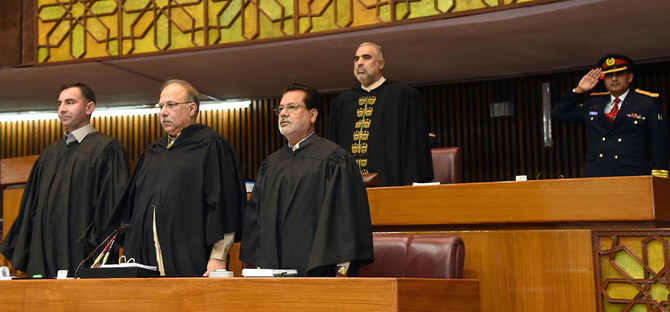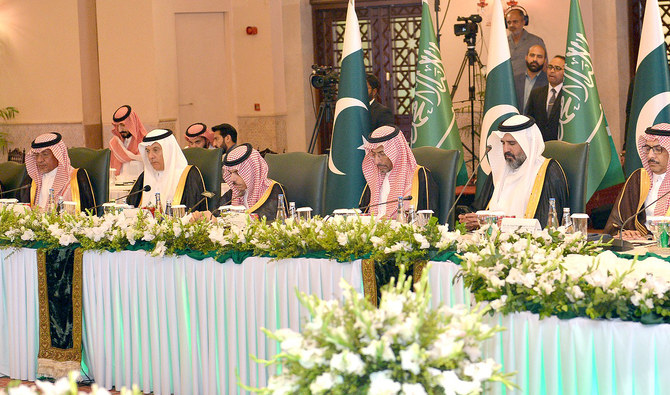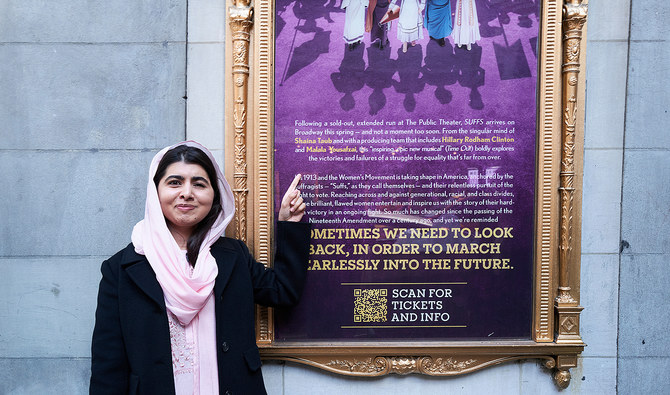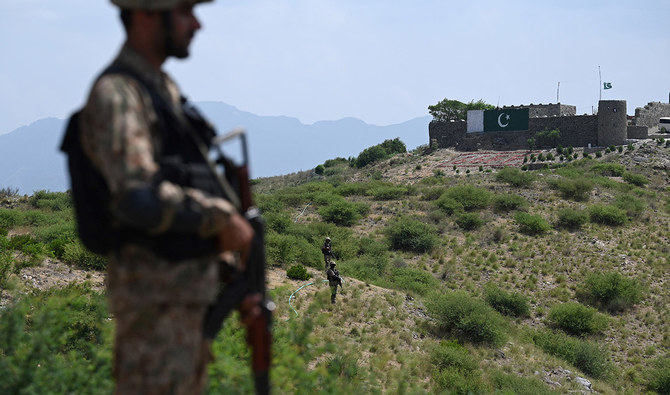ISLAMABAD: Pakistan Prime Minister Imran Khan’s government vowed to collect more taxes and make spending cuts in a closely watched budget presented to parliament Tuesday, weeks after reaching a deal with the IMF for a $6 billion bailout.
Before a rowdy parliamentary session, the government announced plans to slash civil expenditure and freeze military spending while promising to substantially raise revenues to stem a yawning fiscal deficit, and pledging to collect 5.5 trillion rupees ($36 billion) in taxes.
Discontent is simmering in Pakistan following repeated devaluations of the rupee, soaring inflation, and increasing utility costs.
“The country is in a difficult situation,” Khan admitted during a televised address into early Wednesday, but he promised the situation would only continue for several months.
Earlier in parliament the opposition shouted slogans and held up signs against an “unacceptable IMF budget.”
“We have slashed the civil budget by five percent while the military budget will remain the same,” Hammad Azhar, Minister of State for Revenue, said as he announced details of the plan.
“The financial year 2019-2020 will be a year for economic stability. We will make some tough decisions and will try to save the poor public from the effects of those tough decisions,” he added.
Azhar went on to highlight a range of new taxes and increases in existing levies in the new budget, saying raising revenue was pivotal to stabilising the country’s economy.
“As long as we do not improve our tax system Pakistan cannot prosper,” said Azhar, who added that government members and the prime minister had agreed to take a 10 percent salary cut.
Pakistan has struggled for decades to collect taxes. Estimates suggest that only around one percent of the 200-million strong population filed a return in 2018.
Ahead of the budget presentation, Khan took to the country’s airways Monday for the second time in recent weeks to plead with Pakistanis to declare their assets in the latest scheme aimed at increasing tax revenues.
The budget session was dominated by a vocal opposition following a string of arrests of their leaders this week. Members of the PakistanPeople’s Party and Pakistan Muslim League Nawaz chanted throughout the proceedings, drowning out Azhar.
The presentation of Khan’s first budget comes just a day after the government released the latest round of bleak economic figures for the cash-strapped country, showing growth for the current fiscal year falling to 3.3 percent — well below the 6.2 percent target.
Khan’s administration has tried for months but failed to stave off ballooning fiscal and balance of payments deficits, along with low tax yields and mounting debt.
The agreement eked out with the International Monetary Fund still needs final approval by the fund’s board, and it is widely believed the body was waiting to see details of the budget before giving the final sign-off.
Analysts have warned the IMF deal would likely come with myriad restrictions that could thwart Khan’s promises to build an Islamic welfare state, as the country is forced to tighten its purse strings.
He announced the creation of a commission to investigate former leaders and recover money suspected to have been embezzled.
He welcomed the arrest on Monday of former president Asif Ali Zardari, as well as that of legislator Hamza Shahbaz, both in cases of alleged corruption.
Pakistan’s increasing economic woes also come as the country faces possible sanctions from the Financial Action Task Force — a money-laundering monitor based in Paris — for failing to rein in terrorist financing.
The organization will decide soon whether to add Pakistan to a blacklist that would trigger automatic sanctions, further weakening an already faltering economy.
To add to its troubles, the United States has warned it will be watching closely to ensure Pakistan does not use IMF money to repay debts to China, which has poured billions into the country for infrastructure projects under its Belt and Road Initiative.
With new budget following IMF deal, Pakistan resolves to raise revenues
With new budget following IMF deal, Pakistan resolves to raise revenues

- Plans to slash civil expenditure and freeze military spending
- Pakistan has struggled for decades to collect taxes
Australia mulls citizenship for Pakistani guard in Sydney mall attack

- The guard, Muhammad Taha, reportedly said he believed he ‘deserved recognition, consideration for citizenship’ after being stabbed
- He was attacked just after fellow Pakistani security guard, Faraz Tahir, one of the six people killed at the Westfield shopping complex
SYDNEY: Australia’s prime minister said Thursday he will consider granting citizenship to a Pakistani security guard wounded in the deadly Sydney shopping center knife attack.
The guard, Muhammad Taha, reportedly said he believed he “deserved recognition and consideration for citizenship” after being stabbed.
In a bedside interview with The Australian, Taha said he was attacked just after fellow Pakistani security guard Faraz Tahir, one of the six people killed at the Westfield shopping complex in Bondi Junction.
Taha has a graduate visa due to expire in less than a month, the paper said.
The guard reportedly noted that Frenchman Damien Guerot, since dubbed “bollard man,” had been offered permanent residency after video shared on social media showed him using a bollard to fend off the attacker, Joel Cauchi.
Asked in a radio interview if the Australian government would entertain Taha’s citizenship request, Prime Minister Anthony Albanese said: “Yes, we certainly will.”
Albanese described the killing of Faraz Tahir as a “tragedy.”
“This other person, Muhammad Taha, he confronted this guy, the perpetrator, Joel Cauchi, on Saturday. And it just shows extraordinary courage,” the prime minister said.
Both men put themselves in danger to protect Australians they did not know, Albanese said.
“That’s the sort of courage that we want to say thank you to, frankly.”
Albanese said Guerot would receive permanent residency, which he had been seeking, on Thursday.
French President Emmanuel Macron on Tuesday hailed Guerot and his fellow Frenchman Silas Despreaux for trying to stop the mall attacker.
Pakistan kick off T20 World Cup 2024 preparations with New Zealand series today

- Today’s match to see return of Mohammad Amir, Imad Wasim and Naseem Shah to Pakistan’s national squad
- Pakistan’s white-ball captain Babar Azam says team eager to express themselves as a unit in today’s match
ISLAMABAD: The Pakistan cricket team will kick off their preparations for the ICC World Cup 2024 by taking on New Zealand in the first match of the T20I series against the Black Caps in Rawalpindi today, Thursday.
Led by experienced all-rounder Michael Bracewell, New Zealand’s cricket team arrived in Pakistan last week to play the five-match T20I series from April 14-28. Rawalpindi will also host matches on Saturday and Sunday, while Lahore’s Qaddafi Stadium will be the stage for the remaining two matches next week on Thursday and Saturday.
This will be the third five-match series between the two sides inside a 12-month period. Last year, Pakistan and New Zealand drew the series at two-all in Pakistan, while New Zealand clinched the series 4-1 earlier at their home.
“This five-match T20I series holds a lot of importance for us as we look forward to preparing for the all-important mega-event,” Pakistan’s white-ball captain Babar Azam said during a news conference on Wednesday.
“We had a great fitness camp in Kakul and are looking forward to express ourselves as a unit.”
Pakistan have named uncapped Abrar Ahmed, Mohammad Irfan Khan and Usman Khan in the 17-player squad. Pacer Mohammad Amir and all-rounder Imad Wasim, who came back from retirement last month. are also back in the national squad.
The series will also mark fast bowler Naseem Shah’s return to the national squad, who last played for Pakistan in Asia Cup 2023 before suffering a shoulder injury. The injury proved to be a fatal blow for Pakistan, sidelining Shah from the ICC Men’s Cricket World Cup 2023 and tours of Australia and New Zealand.
Bracewell said he was excited to lead New Zealand on the Pakistan tour, adding that his team was raring to play good cricket against the hosts.
“Pakistan are formidable side at home and we’ll look to put challenges in their backyard,” he said.
The match is scheduled to begin at 7:30 p.m. Pakistan Standard Time.
Squads:
Pakistan — Babar Azam (captain), Abrar Ahmed, Azam Khan, Fakhar Zaman, Iftikhar Ahmed, Imad Wasim, Mohammad Abbas Afridi, Mohammad Rizwan, Mohammad Amir, Muhammad Irfan Khan, Naseem Shah, Saim Ayub, Shadab Khan, Shaheen Shah Afridi, Usama Mir, Usman Khan and Zaman Khan
New Zealand — Michael Bracewell (captain), Tom Blundell, Mark Chapman, Josh Clarkson, Jacob Duffy, Dean Foxcroft, Ben Lister, Cole McConchie, Jimmy Neesham, Will O’Rourke, Tim Robinson, Ben Sears, Tim Seifert, Ish Sodhi and Zak Foulkes.
Analysts hail Saudi FM’s ‘significant’ visit, say investments will boost Pakistan’s economy

- Saudi Arabia’s foreign minister visited Pakistan this week to discuss investments and enhance bilateral economic cooperation
- Former diplomat says Saudi investments could increase to $25 billion if Pakistan provides conducive environment to Saudi investors
ISLAMABAD: Former Pakistani diplomats and analysts on Wednesday hailed Saudi Foreign Minister Faisal bin Farhan Al Saud’s “significant” visit to Pakistan, saying that investment agreements reached between the two sides could lead to the creation of thousands of jobs in the South Asian country and boost its economic prospects.
Prince Faisal bin Farhan arrived in Islamabad on a two-day official visit on Monday. The minister led a high-powered delegation to Islamabad with his visit aimed at enhancing bilateral economic cooperation and pushing forward previously agreed investment deals.
His trip came a little over a week after Crown Prince Mohammed bin Salman met Prime Minister Shehbaz Sharif in Makkah and reaffirmed the Kingdom’s commitment to expedite investments worth $5 billion.
Pakistan and Saudi Arabia enjoy strong trade, defense and cultural ties. The Kingdom is home to over 2.7 million Pakistani expatriates and the top source of remittances to the cash-strapped South Asian country.
“Pakistan has longstanding ties with Saudi Arabia but now it has taken a new dimension of economic cooperation,” Zahid Hussain, a senior journalist and political analyst, told Arab News.
“And that’s why this visit was very significant.”
Hussain said the Saudi foreign minister’s visit had turned out to be a “very productive” one as both sides held discussions on investment opportunities that he said Pakistan could offer to Saudi businessmen.
“They have discussed various opportunities which are beneficial for Saudis for investment and that could be said as the turning point in the Pakistan and Saudi relationship,” Hussain added.
During his two-day official trip, the Saudi foreign minister held meetings with top civilian and military leadership including Prime Minister Shehbaz Sharif and army chief General Syed Asim Munir. The Saudi delegation was also briefed by the Special Investment Facilitation Council (SIFC), a key government body set up in June 2023 to fast-track decisions related to international investment in Pakistan’s key sectors IT, mining, energy and agriculture.
Speaking at a joint press conference in Islamabad on Tuesday along with his counterpart Ishaq Dar, Prince Faisal said there was a “significant opportunity” for the Kingdom to increase its investments in Pakistan.
Former diplomat Javed Hafeez said potential Saudi investments will enhance Pakistan’s exports and lead to the creation of thousands of new jobs for Pakistani professionals in the energy, mining, agriculture, and other sectors.
“This would have an overall positive effect on other sectors as well and on Pakistan’s economy,” he noted.
Hafeez said the Kingdom’s investments in Pakistan could increase to the tune of $25 billion from initial investments of $5 billion, provided Islamabad succeeds in ensuring a conducive environment for Saudi investors.
“I see it [initial investments of $5 billion] as a test case,” Hafeez said. “If we can provide the foolproof security [to Saudi investors] and if these projects are successful, then of course much more investment will come.”
‘Suffs’ musical with Malala, Hillary as producers has timing on its side

- ‘Suffs’ is a Broadway musical that focuses on the American women’s suffrage movement
- Pakistani Nobel laureate says musical helped her see her activism from a “new lens“
NEW YORK: Shaina Taub was in the audience at “Suffs,” her buzzy and timely new musical about women’s suffrage, when she spied something that delighted her.
It was intermission, and Taub, both creator and star, had been watching her understudy perform at a matinee preview last week. Suddenly, she saw audience members searching the Wikipedia pages of key figures portrayed in the show: women like Ida B. Wells, Inez Milholland and Alice Paul, who not only spearheaded the suffrage fight but also wrote the Equal Rights Amendment ( still not law, but that’s a whole other story).
“I was like, that’s my goal, exactly that!” Taub, who plays Paul, said from her dressing room later. “Do everything I can to make you fall in love with these women, root for them, care about them. So that was a really satisfying moment to witness.”
Satisfying but sobering, too. Fact is, few audience members know much about the American suffrage movement. So the all-female creative team behind “Suffs,” which had a high-profile off-Broadway run and opens Thursday on Broadway with extensive revisions, knows they’re starting from zero.
It’s an opportunity, says Taub, who studied social movements — but not suffrage — at New York University. But it’s also a huge challenge: How do you educate but also entertain?
One member of the “Suffs” team has an especially poignant connection to the material. That would be producer Hillary Clinton.
She was, of course, the first woman to win the US presidential nomination of a major party, and the first to win the popular vote. But Clinton says she never studied the suffrage movement in school, even at Wellesley. Only later in life did she fill in the gap, including a visit as first lady to Seneca Falls, home to the first American women’s rights convention some 70 years before the 19th Amendment gave women the vote.
“I became very interested in women’s history through my own work, and writing and reading,” Clinton told The Associated Press. And so, seeing “Suffs” off-Broadway, “I was thrilled because it just helps to fill a big gap in our awareness of the long, many-decades struggle for suffrage.”
It was Taub who wrote Clinton, asking her to come on board. “I thought about it for a nanosecond,” Clinton says, “and decided absolutely, I wanted to help lift up this production.” A known theater lover, Clinton describes traveling often to New York as a college student and angling for discounts, often seeing only the second act, when she could get in for free. “For years, I’d only seen the second act of ‘Hair,’” she quips.
Clinton then reached out to Malala Yousafzai, whom Taub also hoped to engage as a producer. As secretary of state, Clinton had gotten to know the Pakistani education activist who was shot by a Taliban gunman at age 15. Clinton wanted Yousafzai to know she was involved and hoped the Nobel Peace Prize winner would be, too.
“I’m thrilled,” Clinton says of Yousafzai’s involvement, “because yes, this is an American story, but the pushback against women’s rights going on at this moment in history is global.”
Yousafzai had also seen the show, directed by Leigh Silverman, and loved it. She, too, has been a longtime fan of musicals, though she notes her own acting career began and ended with a school skit in Pakistan, playing a not-very-nice male boss. Her own education about suffrage was limited to “one or two pages in a history book that talked about the suffrage movement in the UK,” where she’d moved for medical treatment.
“I still had no idea about the US side of the story,” Yousafzai told the AP. It was a struggle among conflicting personalities, and a clash over priorities between older and younger activists but also between white suffragists and those of color — something the show addresses with the searing “Wait My Turn,” sung by Nikki M. James as Wells, the Black activist and journalist.
“This musical has really helped me see activism from a different lens,” says Yousafzai. “I was able to take a deep breath and realize that yes, we’re all humans and it requires resilience and determination, conversation, open-mindedness … and along the way you need to show you’re listening to the right perspectives and including everyone in your activism.”
When asked for feedback by the “Suffs” team, Yousafzai says she replied that she loved the show just as it was. (She recently paid a visit to the cast, and toured backstage.) Clinton, who has attended rehearsals, quips: “I sent notes, because I was told that’s what producers do.”
Clinton adds: “I love the changes. It takes a lot of work to get the storytelling right — to decide what should be sung versus spoken, how to make sure it’s not just telling a piece of history, but is entertaining.”
Indeed, the off-Broadway version was criticized by some as feeling too much like a history lesson. The new version feels faster and lighter, with a greater emphasis on humor — even in a show that details hunger strikes and forced feedings.
One moment where the humor shines through: a new song titled “Great American Bitch” that begins with a suffragist noting a man had called her, well, a bitch. The song reclaims the word with joy and laughter. Taub says this moment — and another where an effigy of President Woodrow Wilson (played by Grace McLean, in a cast that’s all female or nonbinary) is burned — has been a hit with audiences.
“As much as the show has changed,” she says, “the spine of it is the same. A lot of what I got rid of was just like clearing brush.”
Most of the original cast has returned. Jenn Colella plays Carrie Chapman Catt, an old-guard suffragist who clashed with the younger Paul over tactics and timing. James returns as Wells, while Milholland, played by Phillipa Soo off-Broadway, is now played by Hannah Cruz.
Given its parallels to a certain Lin-Manuel Miranda blockbuster about the Founding Fathers, it’s perhaps not a surprise that the show has been dubbed “Hermilton” by some.
“I have to say,” Clinton says of Taub, “I think she’s doing for this part of American history what Lin did for our founders — making it alive, approachable, understandable. I’m hoping ‘Suffs’ has the same impact ‘Hamilton’ had.”
That may seem a tall order, but producers have been buoyed by audience reaction. “They’re laughing even more than we thought they would at the parts we think are funny, and cheering at other parts,” Clinton says.
A particular cheer comes at the end, when Paul proposes the ERA.
“A cast member said, ‘Who’d have ever thought the Equal Rights Amendment would get cheers in a Broadway theater?’” Clinton recalls.
One clear advantage the show surely has: timeliness. During the off-Broadway run, news emerged the Supreme Court was preparing to overturn Roe vs. Wade, fueling a palpable sense of urgency in the audience. The Broadway run begins as abortion rights are again in the news — and a key issue in the presidential election only months away.
Taub takes the long view. She’s been working on the show for a decade, and says something’s always happening to make it timely.
“I think,” she muses, “it just shows the time is always right to learn about women’s history.”
Pakistan Army says seven militants trying to infiltrate border from Afghanistan killed

- Large quantity of weapons, ammunition and explosives were seized from the slain “terrorists,” says army
- Urges Afghanistan to deny the use of its soil to “terrorists” for carrying out attacks against Pakistan
ISLAMABAD: Pakistan Army said on Wednesday that seven militants attempting to infiltrate the Pakistan-Afghanistan border from the neighboring country a day earlier had been killed, urging Kabul to effectively manage its border and deny the use of its soil to “terrorists.”
The Inter-Services Public Relations (ISPR) said seven “terrorists” attempting to infiltrate the Pakistan-Afghanistan border were detected by security forces in the Spinkai area of North Waziristan on Tuesday.
“The infiltrators were surrounded, effectively engaged and after an intense fire exchange, all seven terrorists were sent to hell,” the ISPR said.
“A large quantity of weapons, ammunition and explosives was also recovered from the killed terrorists.”
The army said Pakistan has consistently been asking the Afghan government to ensure effective border management on their side of the border.
“Interim Afghan Government is expected to fulfill its obligations and deny the use of Afghan soil by terrorists for perpetuating acts of terrorism against Pakistan,” the army’s media wing said.
It said Pakistan’s security forces are committed to securing its borders and eliminating militancy from the country.
Pakistan and Afghanistan have traded blame in recent months over who is responsible for a recent spate of militant attacks in Pakistan. Islamabad says the attacks are launched mostly from safe havens in Afghanistan. Kabul’s ruling Taliban deny this and blame Islamabad for not being able to handle its own security challenges.
Tensions skyrocketed when last month Pakistan conducted airstrikes in Afghanistan’s Khost and Paktika provinces against what it said were militant targets. The Afghan Taliban said the strikes killed eight, all of them women and children, prompting them to fire heavy weapons at Pakistani forces along the border.
Relations between the two countries had taken a hit earlier in November 2023 when Pakistan kicked off a deportation drive that has seen around half a million so-called undocumented Afghan refugees expelled from the country.










